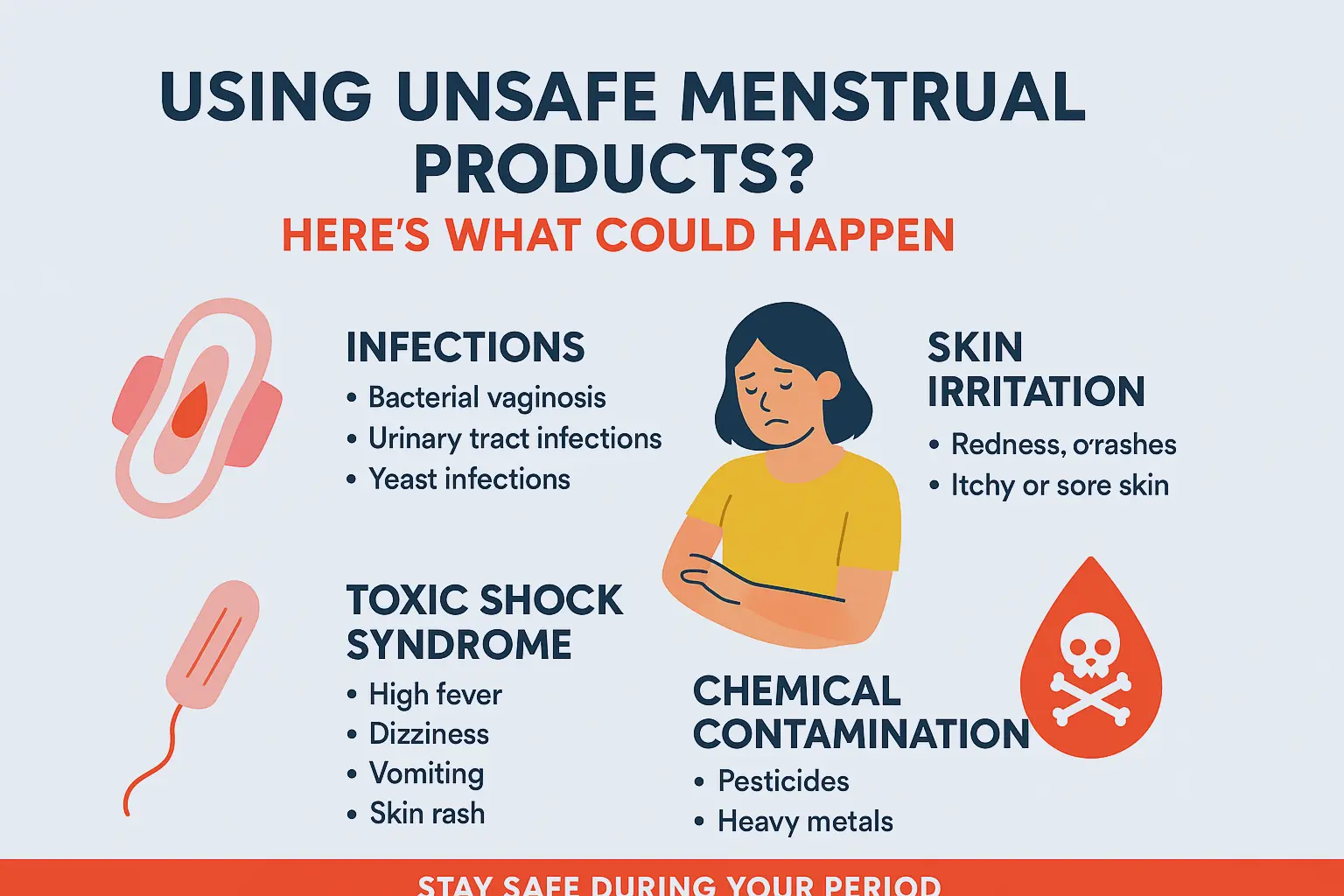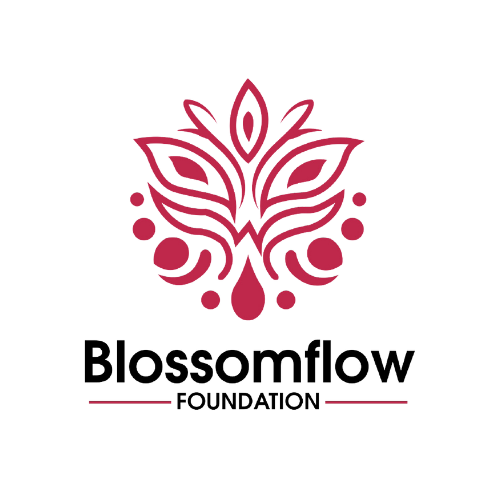
Using Unsafe Menstrual Products? Here’s What Could Happen
Menstruation is a natural process, but how we manage it plays a big role in our health. Pads, tampons, menstrual cups, and reusable cloth pads are all designed to make periods more comfortable and hygienic.
But here’s the problem: if these products are unsafe, dirty, or poorly made, they can harm your body. Unsafe menstrual products can cause infections, skin irritation, toxic shock syndrome, and even expose you to harmful chemicals.
This guide breaks down exactly what happens to your body when you use unsafe menstrual products, explained in a clear and relatable way.
-
What Counts as an Unsafe Menstrual Product?
Menstrual products can be unsafe if they are:
- Dirty or reused without proper cleaning – e.g., a reusable pad that hasn’t been fully washed and dried.
- Expired – old pads or tampons may lose their absorbency and collect bacteria.
- Made with harmful materials – some low-quality pads contain plastic fibers, dyes, or chemicals that can irritate skin.
- Improperly stored – kept in damp or dusty environments where bacteria and mold can grow.
- Tampered or unsealed – damaged packaging may allow germs to enter.
NOTE: Even reusable products like menstrual cups or cloth pads can be unsafe if you don’t wash and store them correctly.
-
The Health Risks You Might Face
Bacterial and Fungal Infections
When menstrual blood is absorbed into a pad, tampon, or cloth, it creates a warm and moist environment where bacteria and fungi grow quickly. Using an unclean product can lead to:
- Bacterial Vaginosis (BV) – symptoms include foul-smelling discharge, itching, and irritation.
- Urinary Tract Infections (UTIs) – burning sensation during urination, pelvic pain, and fever.
- Yeast Infections – white clumpy discharge, intense itching, and redness.
NOTE: If left untreated, these infections can spread to other parts of the reproductive system and cause long-term problems like infertility.
Skin Irritation and Allergic Reactions
Poor-quality pads can rub against your skin, especially if you’re moving around a lot, leading to:
- Redness and rashes
- Itchy or burning skin
- Painful sores
NOTE: Sometimes, the irritation is caused by perfumes, dyes, or bleaching chemicals in the product. Sensitive skin can react severely to these additives.
Toxic Shock Syndrome (TSS)
TSS is a rare but serious infection caused by Staphylococcus Aureus Bacteria. It often happens when tampons are left in too long or when products aren’t sterile.
Symptoms include:
- Sudden high fever
- Dizziness or fainting
- Vomiting or diarrhea
- Sunburn-like skin rash
NOTE: TSS can be life-threatening, so immediate medical care is essential.
Exposure to Harmful Chemicals
Some low-cost menstrual products are made with materials that contain:
- Dioxins – from bleaching cotton, linked to cancer risk.
- Pesticides – from non-organic cotton farming, which can disrupt hormones.
- PFAS (Forever Chemicals) – linked to reproductive and immune system problems.
- Heavy Metals – traces of lead, mercury, or arsenic in some synthetic materials.
NOTE: These chemicals can enter your body through the skin or mucous membranes and accumulate over time.
-
How to Protect Yourself during Your Period
Choose High-Quality Products
- Look for certified organic cotton pads or tampons.
- Use menstrual cups made from medical-grade silicone.
- Buy from reputable brands that meet hygiene standards.
Practice Proper Hygiene
- Wash your hands before and after changing menstrual products.
- Change pads/tampons every 4–8 hours.
- For menstrual cups, empty and wash them at least twice a day with mild soap and hot water.
- Wash cloth pads in hot water with soap, rinse well, and dry in sunlight to kill germs.
Store Products Safely
- Keep pads and tampons in a cool, dry place.
- Avoid storing them in damp bathrooms for long periods.
- Keep reusable products in breathable cotton bags, not plastic.
-
When to See a Doctor
You should seek medical help if you notice:
- Persistent itching or burning sensation.
- Strong or unusual vaginal odor.
- Fever or flu-like symptoms during your period.
- Abnormally heavy bleeding.
- Pain that doesn’t go away after your cycle.
NOTE: These could be early signs of infection or another serious condition.
Conclusion
Your period is a sign that your body is healthy and functioning normally, but the menstrual products you use can make a big difference to your overall well-being. Using safe, clean menstrual products helps prevent infections, skin problems, and exposure to harmful chemicals.
Think of your menstrual health as an investment: the better care you take now, the fewer problems you’ll have in the future. Your body deserves safe, hygienic, and high-quality care—every single month.
FAQs
Q: Can I use cloth pads instead of disposable pads?
Yes, as long as they’re washed properly with hot water and soap, fully dried in sunlight, and stored in a clean place.
Q: How often should I change my pad or tampon?
Every 4–8 hours, or sooner if it’s soaked.
Q: Are all cheap menstrual products unsafe?
Not necessarily, but some cheaper brands may skip strict safety checks. Always read labels and check for certifications.
All Categories
Recent Posts
Why SDG 4 Cannot Be Achieved Without Ending Period Poverty
Tags
Give them a helping hand
Every donation fuels our mission to combat period poverty. Your generosity brings us closer to menstrual equity.
+234-909-482-1642
inquiries@blossomflow.org




